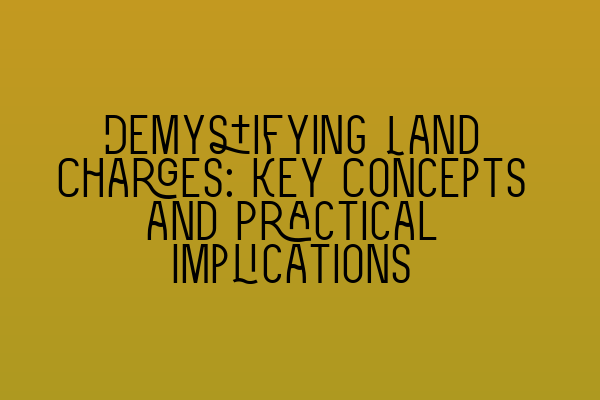Demystifying Land Charges: Key Concepts and Practical Implications
Welcome to the SQE Property Law & Land Law blog! In this post, we will demystify the complex world of land charges and explore their key concepts and practical implications. Land charges are an essential part of property law, and having a solid understanding of them is crucial for solicitors practicing in this area. So, whether you are an aspiring solicitor, a property law enthusiast, or simply curious about the topic, this post is for you!
What are Land Charges?
Land charges refer to encumbrances or burdens that affect a specific parcel of land or property. They are registered against the title of the land and act as a warning to potential buyers or lenders about certain interests or restrictions that may affect the property. These charges can significantly impact the use, transfer, or financing of the land, and it is essential for solicitors to identify and understand them before advising their clients.
Key Concepts
Before diving into the practical implications of land charges, let’s familiarize ourselves with some key concepts:
- Types of Land Charges: Land charges can be categorized into two main types: Class D and Class F. Class D charges include restrictive covenants, equitable easements, and certain statutory rights of way. Class F charges, on the other hand, include miscellaneous charges not falling within Class D, such as local land charges and bankruptcy notices.
- Registration: Land charges are registered with the Land Charges Department, which is part of the HM Land Registry. The registration process involves filling out the appropriate form and paying the required fee. Once registered, land charges become public records accessible to anyone who conducts a search on the property.
- Priority: The priority of land charges determines their ranking in relation to other charges registered against the same property. In general, charges are ranked according to the date and time of their registration. However, certain charges may have priority status due to specific legislation or contractual agreements.
- Effect on Property Transactions: Land charges can have significant implications for property transactions. They can restrict the use of the land, impose obligations on the owner, or even render the property unmarketable. As a solicitor, it is crucial to identify and assess the impact of land charges on your client’s transaction and advise accordingly.
Practical Implications
Understanding the practical implications of land charges is essential for solicitors handling property transactions. Here are some key considerations:
- Due Diligence: Conducting thorough due diligence is crucial when dealing with land charges. This includes conducting searches with the Land Charges Department, local authorities, and other appropriate registries to identify any existing charges on the property. Failing to uncover a significant land charge can result in serious consequences for your client.
- Negotiations: If a property is subject to a land charge that may affect your client’s interests or intended use of the land, it may be necessary to negotiate with the charge holder. This could involve seeking their consent for specific actions or negotiating the terms of the charge to minimize its impact on your client’s objectives.
- Disclosure: As a solicitor, you have a duty to ensure that any relevant land charges affecting your client’s property are properly disclosed to potential buyers or lenders. Failure to disclose material land charges can lead to legal disputes and potential liability.
- Resolving Land Charge Issues: In some cases, it may be necessary to take steps to resolve land charge issues. This could involve applying for the removal or modification of a charge, seeking indemnity insurance to mitigate risks, or entering into negotiations with all interested parties to reach a satisfactory solution.
Demystifying land charges is a complex task, but with a solid understanding of the key concepts and practical implications, you can navigate this area of property law with confidence. As a solicitor, it is crucial to stay updated on any changes or developments in land charge legislation and case law to provide the best possible advice to your clients.
If you found this article helpful, you may also be interested in reading the following related articles:
- Misrepresentation in Contracts: Unveiling Deceptive Practices
- A Closer Look at SQE Contract Law Syllabus
- SQE Contract Law: Analyzing Landmark Cases and Influential Judicial Decisions
- Understanding Contractual Capacity: Rights and Limitations
- Interactive SQE Mock Tests for Contract Law: Test Your Knowledge
Thank you for reading our blog post on demystifying land charges. We hope you found it informative and useful. If you have any further questions or would like to discuss a property law matter, please don’t hesitate to get in touch with us at SQE Property Law & Land Law. We are here to help!
